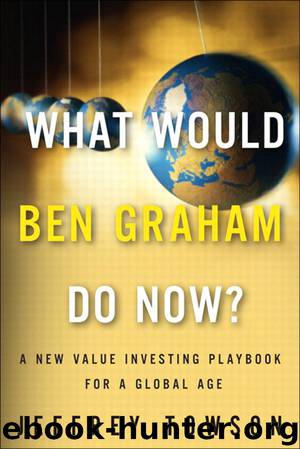What Would Ben Graham Do Now?: A New Value Investing Playbook for a Global Age (Pioneer Panel's Library) by Jeffrey Towson

Author:Jeffrey Towson
Language: eng
Format: epub
Publisher: FT Press
Published: 2011-06-19T16:00:00+00:00
From the New to the Newer World
Global value investing requires understanding the movement of capabilities and how this impacts competition and profits
It may be in part myth, but the story goes this way: During the 1920s, some Dutch businessmen went prospecting in the newly formed country of Saudi Arabia. At that time, Saudi Arabia was a large and mostly empty desert kingdom, populated mainly by small villages and desert-living Bedouins. The government was run from a mud palace in Riyadh, and the House of State often consisted of a traveling caravan of camels. It is said that the small country’s treasury was carried in the camels’ saddlebags.
To say doing business in Saudi Arabia in the 1920s was an adventure is a fairly big understatement. The country was poor and uneducated and had one of the world’s harshest climates—particularly the Empty Quarter, the large, unlivable stretch of desert that constitutes the eastern part of the country. It is rumored that at various points in the country’s history, people were killed simply by taking them out and leaving them in the Empty Quarter. Argentina’s Dirty War would later revive a variation on this tactic by flying people out and dropping them in the Atlantic Ocean.
What is known for sure is that the Dutch businessmen met with the young government of King Abdulaziz, the founder and first king of Saudi Arabia. And in 1926, Foreign Minister Prince Faisal (later King Faisal) traveled to the Netherlands on a diplomatic mission. Out of this, a joint-venture deal was struck that would create the first bank in what would shortly thereafter become the world’s oil capital.
The joint venture made simple business sense. The country’s residents kept their money in goats and camels (as assets) and in saddlebags (literally). The businessmen had banking expertise and the ability to create a relatively modern private bank. It was a deal based on capabilities. In 1926, they launched Saudi Arabia’s first bank, called the Netherlands Trading Society, which acted as both a private commercial bank and the central bank for the country. This bank would eventually evolve into Saudi-Hollandi bank, still one of the country’s top banks.
Twelve years after the launch of Saudi Arabia’s first bank, oil was discovered in the Kingdom, and similar Saudi-foreign bank joint ventures followed quickly (Saudi-British Bank, Saudi-American Bank, Saudi-Fransi Bank). Such capability-driven joint ventures still dominate the Middle East business and investment landscape. Not only banks but virtually every Middle East business is a similar combination of local assets and Western capabilities.
This original Dutch stake in the Saudi-Hollandi bank was later bought by ABN AMRO and eventually was caught up in the 2007 Royal Bank of Scotland Group (RBS)-Barclays bidding war for that bank. While Barclays and RBS were fighting to acquire ABN AMRO, Prince Waleed and other Saudi investors were vying to acquire ABN AMRO’s 40% stake of Saudi-Hollandi. Saudi banks are coveted assets, particularly when oil is more than $80 per barrel.
For investors and deal-makers on the ground around the world, very
Download
This site does not store any files on its server. We only index and link to content provided by other sites. Please contact the content providers to delete copyright contents if any and email us, we'll remove relevant links or contents immediately.
Rich Dad Poor Dad by Robert T. Kiyosaki(6613)
Pioneering Portfolio Management by David F. Swensen(6289)
How To Win Friends and Influence People by Dale Carnegie(4504)
The Money Culture by Michael Lewis(4198)
The Dhandho Investor by Mohnish Pabrai(3760)
The Wisdom of Finance by Mihir Desai(3735)
Liar's Poker by Michael Lewis(3441)
Fooled by Randomness: The Hidden Role of Chance in Life and in the Markets by Nassim Nicholas Taleb(3108)
The ONE Thing by Gary Keller(3066)
The Intelligent Investor by Benjamin Graham Jason Zweig(3036)
Mastering Bitcoin: Programming the Open Blockchain by Andreas M. Antonopoulos(3035)
The Psychology of Money by Morgan Housel(2986)
Rich Dad Poor Dad: What The Rich Teach Their Kids About Money - That The Poor And Middle Class Do Not! by Robert T. Kiyosaki(2954)
Investing For Dummies by Eric Tyson(2948)
How to Day Trade for a Living: Tools, Tactics, Money Management, Discipline and Trading Psychology by Andrew Aziz(2944)
How to Win Friends and Influence People by Dale Carnegie(2912)
Market Wizards by Jack D. Schwager(2698)
How to Pay Zero Taxes, 2018 by Jeff A. Schnepper(2646)
Zero Hour by Harry S. Dent Jr. & Andrew Pancholi(2645)
